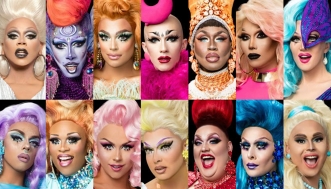
Priscilla, queen of my heart
When I was a little girl, I loved drag queens more than anything. It was back in the days when video stores were still around, and my babysitter asked me which film I wanted to rent. Of course I said Priscilla Queen of the Desert, which was my absolute favourite as an eight year old, and I couldn’t believe she hadn’t seen it already. By the end of the film she was rather shocked, but I remember thinking thank god I am a girl. My thought was that if I had been a boy I would have had to be a drag queen, and things would have been really tough. To me being a feminine as a girl was like being a drag queen too, you just didn’t get hate for it.

Paris is Burning
Priscilla, and films like Paris is Burning before it, helped to make drag intelligible to a mainstream audience. Today RuPaul’s Drag Race continues to work that magic, bringing a greater awareness of drag culture as well as a diversity of queens into the spotlight with each season.
But even though everyone is watching Drag Race, word on the street for those in the know is that you’ve got to be a bit careful because drag queens are, well, a bit of a drag. So the story goes, drag queens—at least those “normy” hyper-feminine ones—are just reinforcing every stereotype of womanhood that feminism has ever fought against.
Strangely this critique of drag comes from two, usually wildly oppositional, directions within discussions of gender.
 The first is from trans-exclusionary radical feminist types, who conflate gay male culture with drag queens with transgender identity. Such perspectives see gay men, drag queens, and trans women as responsible for propping up fantasies of femininity that only serve to oppress women. Germaine Greer famously stated in The Female Eunuch 1970: “I’m sick of being a transvestite. I refuse to be a female impersonator. I am a woman, not a castrate”. Greer’s suggestion here is that there is some form of “natural” womanhood that can be liberated from the dictates of culture. Similarly, and more recently, Sheila Jeffreys has even argued that drag kings distort lesbian culture and the celebration of “natural” womanhood. She writes: “If the suffering and destruction of lesbians is to be halted then we must challenge the cult of masculinity that is evident in such activities as drag king shows”. These views are rife with homophobia and transphobia, as well as massive conflations and wild leaps that see men, masculinity, and femininity, as the true oppressors of women.
The first is from trans-exclusionary radical feminist types, who conflate gay male culture with drag queens with transgender identity. Such perspectives see gay men, drag queens, and trans women as responsible for propping up fantasies of femininity that only serve to oppress women. Germaine Greer famously stated in The Female Eunuch 1970: “I’m sick of being a transvestite. I refuse to be a female impersonator. I am a woman, not a castrate”. Greer’s suggestion here is that there is some form of “natural” womanhood that can be liberated from the dictates of culture. Similarly, and more recently, Sheila Jeffreys has even argued that drag kings distort lesbian culture and the celebration of “natural” womanhood. She writes: “If the suffering and destruction of lesbians is to be halted then we must challenge the cult of masculinity that is evident in such activities as drag king shows”. These views are rife with homophobia and transphobia, as well as massive conflations and wild leaps that see men, masculinity, and femininity, as the true oppressors of women.
 I don’t have much time for these views, which encourage us to believe that the biggest threats to women are trans women, drag queens, and gay men. This view distorts Marxist theory to argues that men in particular are *the* class that oppresses women, and sees the liberation that is to be won as a liberation from “gender”. Luckily the currency of radical feminism in academic spaces seems to be waning. But when overall activist struggle in society is low, it is easy for people to slip into arguing that we are each other’s problem, that if only we could free ourselves from gender we’d be truly liberated. It’s a much easier argument to make than organising to transform the fundamental economic arrangement of society, and it makes space for all kinds of class collaboration between powerful women and poor women alike (even if it means at the end of the day that power doesn’t actually shift).
I don’t have much time for these views, which encourage us to believe that the biggest threats to women are trans women, drag queens, and gay men. This view distorts Marxist theory to argues that men in particular are *the* class that oppresses women, and sees the liberation that is to be won as a liberation from “gender”. Luckily the currency of radical feminism in academic spaces seems to be waning. But when overall activist struggle in society is low, it is easy for people to slip into arguing that we are each other’s problem, that if only we could free ourselves from gender we’d be truly liberated. It’s a much easier argument to make than organising to transform the fundamental economic arrangement of society, and it makes space for all kinds of class collaboration between powerful women and poor women alike (even if it means at the end of the day that power doesn’t actually shift).

I heart Judy B 4eva
Understandably in many queer critical circles, no one has much time for radical feminism. For example Judith Butler—our queer theory queen writ large—has openly critiqued Jeffreys, describing her views on trans women as a “feminist tyranny”. At the end of Gender Trouble (1990) Butler famously held drag queens up as exemplars of gender subversion. There was of course a lot of responses to this, but much of these debates focused on whether drag really was the best example of the theory of gender performativity that Butler was proposing.
 So that’s why it’s kind of surprising to hear people within queer communities suggesting now that drag, in its mainstream formations, is a problem. From this perspective drag, if performed by ostensibly cis males, reproduces misogynistic ideas of femininity and is really just another expression of the “gay-triarchy“. Drag that is seen as more alternative in these scenes is drag performed by faux-queens (women performing as drag queens), or drag that queers gender in some way, like the intense influx of bearded-queens we’ve seen in recent years.
So that’s why it’s kind of surprising to hear people within queer communities suggesting now that drag, in its mainstream formations, is a problem. From this perspective drag, if performed by ostensibly cis males, reproduces misogynistic ideas of femininity and is really just another expression of the “gay-triarchy“. Drag that is seen as more alternative in these scenes is drag performed by faux-queens (women performing as drag queens), or drag that queers gender in some way, like the intense influx of bearded-queens we’ve seen in recent years.

I love Sasha but I don’t doubt we occupy the same ivory tower
Within the land of RuPaul, this desire for more alternative drag to address the “problems” of drag culture is summed up by Sasha Velour. Now, there is no way that I am not #TeamSasha, obviously I love Sasha. But she also represents an extremely mobile, well-educated subset of drag culture, who can quote Butler and play with the expectations of drag (like, having a bald head) because let’s face it, they’re still going to get by even if they don’t win $100,000.
What the queer critique of drag shares with the radical feminist perspective is the view that we are one another’s oppressors, and that if we manage to transform our individual gendered selves in a particular way, this can contribute to liberation. For the rad fems this might mean rejecting expectations of femininity and trying to embody “natural” womanhood. From the queer perspective this might mean rejecting anything perceived as mainstream and normative. The conclusions are the same: do your politics through your body, and reject those individuals who don’t.

The cast of Season 9
Let’s pause here to imagine why someone might get into drag (noting that the great thing about Drag Race is that we get to hear some of these reasons). For some, drag offers a space to play around with femininity, after growing up as a “weird” kid who didn’t meet the expectations of masculinity. For others, drag is a way of working through questions of sexual and/or gender identity. For many that have been kicked out of home or found themselves rejected by society at large, drag offers a space for new forms of family to emerge.

Drag queens can be comrades too
For many, drag is a mode of survival, socially and economically. Drag queens struggle with expectations around femininity too. Drag queens don’t oppress women: the struggle against sexism is a shared one. There is a lot to be learned from RuPaul’s constant reminder that “we’re all born naked and the rest is drag”.
So, let’s celebrate those drag queens that can push boundaries and show us new ways to think about gender, but let’s embrace those “normy” queens too. This doesn’t mean everything in drag culture should be immune from critique, but it does mean we should give drag a chance. After all, the struggle is best won together, not alone, and drag queens are not the enemy.

You must be logged in to post a comment.